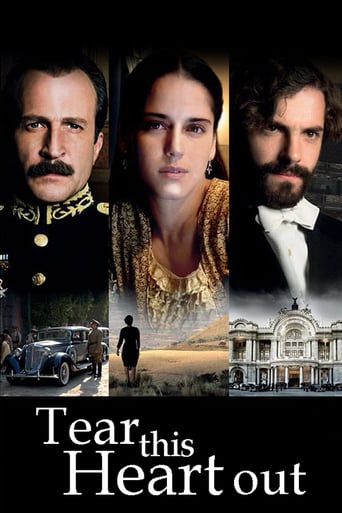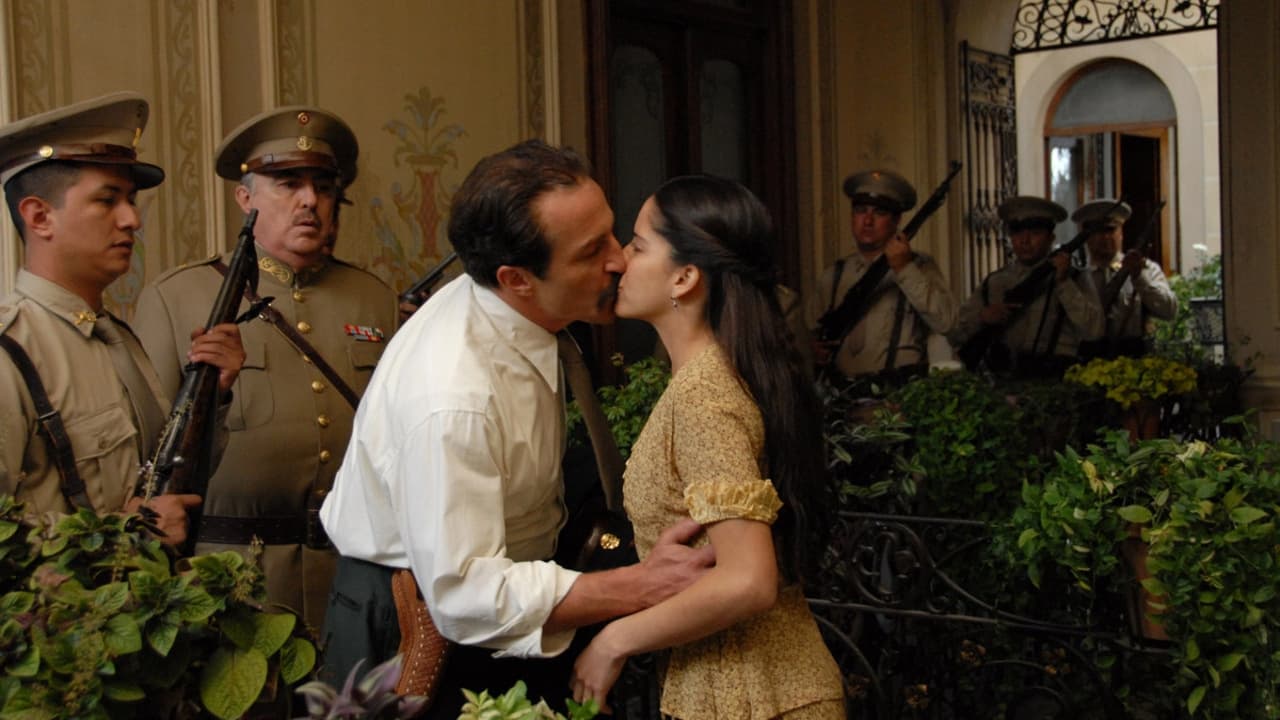emuir-1
Living in the USA I am daily subjected to a negative view of Mexico and its people, whom certain Americans feel should keep quiet, stay in Mexico and do as they are told (by good old Uncle Sam); therefore, it is a pleasure to watch a film, which counters this negative stereotype and shows a beautiful country with its own way of life - sometimes good, sometimes bad. The political system may appear corrupt to the American style, but it is theirs and some of them achieve their aims by violence rather than purchasing them. Mexico is not alone in military strong men running the country. I have not seen many Mexican films, "Like Water for chocolate" was probably the first, but I have watched several telenovellas and enjoy seeing the ways and traditions of our next door neighbor. I gave this fine film a 10 as it was excellent, and I hope to see more such films in the future.
jotix100
Angeles Mastretta's 1985 novel, "Arrancame la vida", was a huge success in Mexico as well as in many Spanish speaking countries. The title, which can be translated as "tear out my life", was also the title of a famous Mexican song, which is heard at the end of the film sung by Tona La Negra, one of the best Mexican singers of all times.The narrative centers around Catalina Guzman. As the story begins, she is a young woman that is dazzled by a much older man, Andres Ascencio. They get married, much against her father's objections. Catalina is not prepared for what her life will turn out with her new status. Andres, an ambitious, and well connected man in Puebla, decides to run for governor of the state. Before getting married Catalina had consulted a seer to see what her future will be and the fact she wanted to 'feel'. The woman's advice is a blunt one: she will use her sex in order to fulfill herself. A prophetic omen, indeed.Right after Catalina and Andres have their first child, he comes in with two other children he had sired with another woman. Catalina, who is inexperienced, plus having to rear her own infant, is confused and resentful of the strangers that are thrown into her lap; a new responsibility she didn't count on. Andre, a womanizer, will bring another daughter into the household.Andres decides to take the family to Mexico City where he will be closer to influential people as he wishes to run for the presidency, eventually. Walking into the Bellas Artes auditorium one day, Catalina watches a rehearsal of the local symphony orchestra. The director, Carlos Vives, gets annoyed with her presence. He wants her to step to the rear of the theater where she will not distract the players. That meeting will mark a turning point in Catalina's life. Unfortunately, Catalina doesn't realize how her amorous involvement with Carlos will change her life as well as cause his death.This epic account of Ms. Mastretta's novel was written and directed by Roberto Sneider. The film gets the basic points of the novel in cinematic terms resulting in an engrossing story that, although predictable up to a point, doesn't prepare the viewer for the way Catalina's resolve will free her at the end.Ana Claudia Talancon, who we first met in "El crimen del padre Amaro", makes an excellent impression with her Catalina. Ms. Talancon goes from a young woman to a sophisticated society lady effortlessly. Equally good is the Andres of Daniel Gimenez Cacho, a wonderful actor that always delivers. Jose Maria De Tavira appears as Carlos Vives, the orchestra leader that falls in love with Catalina.Javier Aguirresarobe's cinematography takes us to places in Mexico that are overlooked by most of his fellow cameramen. The music by Leonardo Heilblum and Jacobo Lieberman does wonder for the picture. Roberto Sneider, an actor turned director, shows he has a talent that needs to be seen.
BStruthandlogic
"Arráncame la Vida" is a story from the perspective of Catalina Guzmán. At 16 she marries Andrés Ascencio and at 30 becomes his widow. He is a political machine always looking to rise within the ranks of politics the way he did in the military ranks during the Mexican Revolution. There were several omissions in the movie. Honestly, I believe that this is why the movie fell flat in a lot of ways, at least for me. I never thought I would be one of those people who says it wasn't as good as the book but it really was not as good as the book.In the book, you begin to like Andrés for various reasons as you continue reading because, even though he had moments of misogyny and murder, he was teaching her how life works and how people can be. He was teaching her to defend herself and survive all the Bull that people shovel your way especially when they see you alone and "vulnerable". After a while you really don't find Catalina all that charming. For a grown woman, she behaved very immaturely. It seemed as though throwing temper tantrums were her forté. When he does die, he does point out that he hurt her and he does it in a very direct way. They made light of that in the movie but it wasn't a light moment in the book. He also does not tell her he left her everything until he calls in the attorneys and changes his will in front of her. He says he leaves her everything of his own accord in front of witnesses, so that no one can contest the will. She is peeved because now she has to determine how things get distributed. The thing with the tea was open ended in the book because you don't know if she killed him or if he became addicted to the tea. According to the book, if you drank it in large amounts it could kill you. He was drinking it every day in large amounts in the book. She lets him know before he drinks the last of the tea that it would be best if he not have anymore but he insists. Reverse psychology? maybe.The other thing that they left out was the lesbian scene that Catalina has with Andrea Palma.Then the funeral. It was in the home during the wake that Rodolfo comes at her with offering to help her with the will. She tells him to stay out of it because she has it under control and does not need his help. He does not respond because he doesn't know how. He goes over to the casket and pretends to look heartbroken but the boredom sets in. Then there was also Rodolfo's desire for Catalina. She remembers when his fat ass chased her in a red dress Andrés had bought her in NY and she threatens Rodolfo with telling Andrés about his behavior. Rodolfo was interested in exploiting Andres's death to get into Catalina's pants and gain access to the fortune Andrés had amassed. He didn't think she was very smart or that she was a quality woman the way they inferred in the movie. The movie did not show Doña Herminia either. It also did not fully explain the story concerning his first wife. The movie did also not talk about Virginia. There was more to it than was inferred in the movie. The other thing was that he was going to be buried in Zacatlán. In the book it was raining which is significant. If you are going to watch this movie read the book afterward. I think you will enjoy the book more than the movie.
Nazi_Fighter_David
Mexican director Roberto Sneider wrote the script of "Tear This Heart Out" ("Arráncame la Vida") with the author and winner of the Mazatlán Prize for Literature for the best book of the year Ángeles Mastretta published in Mexico in 1985 partially inspired by the life of Maximino Ávila Camacho, a four-star general in Mexico's revolutionary forces, brother of Manuel Ávila Camacho who was President of Mexico from 1940 to 1946...The film opens with the beautiful Catalina Guzmán (Ana Claudia Talancón) marrying at her early age a charismatic and cunning general named Andrés Ascencio (Daniel Giménez Cacho), much older than her
Dazzled by his world, Catalina escorts him on his political campaigns, perceiving at his side the intriguing political systems to obtain social justice... Catalina, a smart but not an educated young woman, dedicates years of her youth to a 'loving' husband
She comes to Puebla to hear from the voice of her man, the governor of the beautiful city, that soon she will be the First Lady of Mexico as he considers himself the best-qualified candidate to win the race for the Presidency... But one day, Catalina finds out that her arrogant and prepotent macho man is cheating on her with several women and has several children out of that relationship
But in spite of all that, and observing her husband's pervert and bad manners, Catalina continues to live with Andrés, to bear his two children, to train his others children in her family, to serve him as his adviser and to guide him to win elections, taking intense pleasure from that attitude
Nevertheless she learns that life and power are not always so pink
There is a scene during her pregnancy, where we saw her detecting that she is totally neglected
So, for the first time we watch her taking pleasure in having a love affair with a teenager who cherished her dearly
But the movie takes a dramatic turn when Catalina falls really in love with a concertmaster... And it was forbidden for her to fall in love! And she executes her cruel vengeance on Andrés sharing the musician' bed ignoring the predestined course of his future fate
And here Roberto Sneider's motion picture clearly comes off with three significant national old traditions: the 1930's post-revolutionary Mexico, the very crucial point for the Mexican girl, the "rite of passage," and the traditional macho man
The film is a love story through which three main characters are important for the viewer: Andrés, the charming officer, the great orator with the voice so thrilling and so impacting
His wife Catalina divulging how meaningless and insincere his promises are
And Carlos (Jose María de Tavira), the leader of the orchestra, the future of a new Mexico, the rebel, and what Mexico is expecting from her younger men
The motion picture presents the concept of the long-suffering Mexican woman vanishing here with Catalina as seen powerful of character, efficacious and extreme in having an affair with the man she deeply falls in love, intense in degree to accept whatever she is asked from her lover to carry out
Her representation of the submissive wife, in a macho world where women are suppressed and their voices not heard, has fallen with her determined and ambivalent character here, as near Carlos, Catalina is another woman who wishes, requests, and desires intensely the enjoyment of her personal liberty and personal efficacy
The result is a fine rich movie with many captivating visuals of the stunning state of Puebla, and definitely a must-see, at least for the Mexican viewers


 AD
AD



